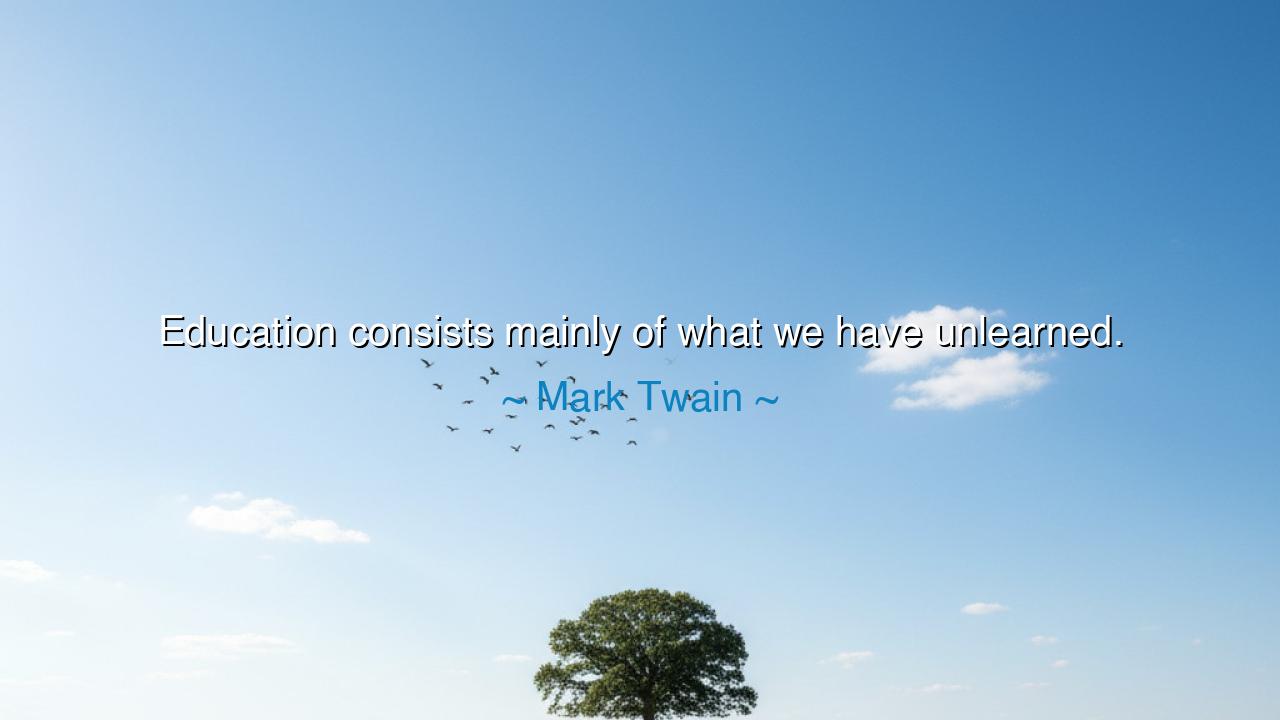
Education consists mainly of what we have unlearned.






Hear now, O seekers of wisdom, the words of Mark Twain, the sharp-tongued sage of America, who declared: “Education consists mainly of what we have unlearned.” Though simple in form, this saying strikes like lightning, revealing a hidden truth: that to grow wise is not only to gather new knowledge, but to cast away the falsehoods, illusions, and half-truths that bind the mind in chains.
The origin of this utterance lies in Twain’s deep suspicion of blind convention and inherited belief. He lived in a time when societies clung to traditions that often contradicted reason and justice. He saw men enslaved not only by ignorance, but by what they wrongly thought they knew. Thus he proclaimed that the true path of education is often a journey of unlearning—breaking the idols of error so that the temple of truth may be built.
Consider the example of Galileo Galilei. The world once believed that the earth was the center of the universe, and men were content in this error, passing it down from father to son as unquestioned truth. Galileo, through his telescope, saw otherwise. But before he could proclaim new knowledge, he had to unlearn the false teachings that had ruled for centuries. He paid dearly for it, yet his courage shows the wisdom of Twain’s words: true education requires the humility to surrender the false in order to embrace the true.
And ponder the life of Frederick Douglass. As a boy born in slavery, he was told that he was less than a man, that bondage was his destiny, and ignorance his portion. But when he learned to read, he also began to unlearn these lies. He cast away the falsehoods imposed by his oppressors, and in doing so, he rose to become a voice of freedom for millions. His story reveals that unlearning is not merely an act of the mind, but of liberation—it breaks chains, both visible and invisible.
So it is with us all. We are taught by our cultures, our families, our times, many things that are not wholly true. We inherit prejudices, fears, and narrow visions. We cling to the comfort of the familiar, even when it blinds us to greater realities. Thus Twain reminds us: if you wish to be truly educated, you must be ready not only to learn, but to unlearn—to question, to doubt, to let go of comforting illusions, and to stand naked before the hard light of truth.
The lesson is clear: the wise do not hoard knowledge as treasure without testing its worth. They sift it as gold is sifted from dross, keeping what is pure and discarding what is false. Unlearning is as sacred as learning, for without it, the mind becomes a vessel filled with poison rather than water. It is better to empty the cup and refill it with clean truth than to drink deeply of lies.
Practical action lies before you. Question what you have been taught, not with arrogance, but with courage. When you encounter new truth, do not be afraid to lay aside old errors, even if they are cherished by tradition or authority. Read widely, listen deeply, and be ready to change your mind when reason and conscience demand it. Teach your children not only facts, but the art of discernment, the courage to unlearn what is false.
Thus let Twain’s words be etched in your hearts: Education is not the piling up of facts, but the transformation of the soul through truth. To unlearn is to be reborn, to cast off shadows and walk in light. Blessed are those who are humble enough to admit error, for they are the ones who ascend the path of wisdom.






AAdministratorAdministrator
Welcome, honored guests. Please leave a comment, we will respond soon